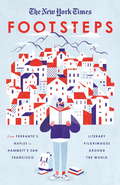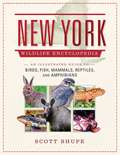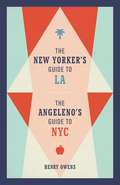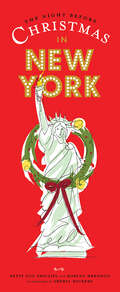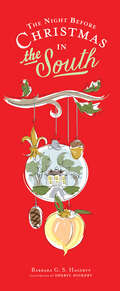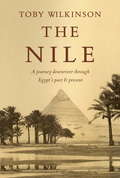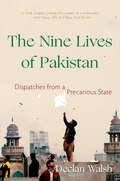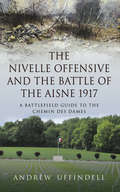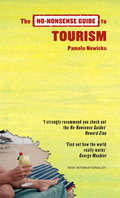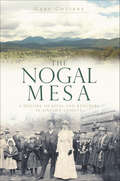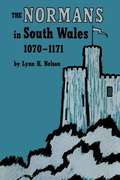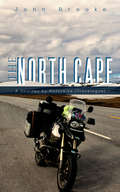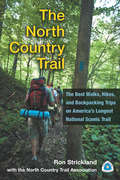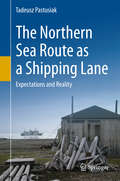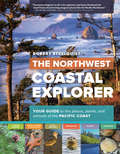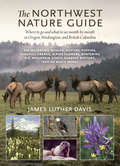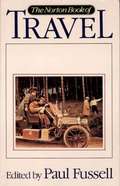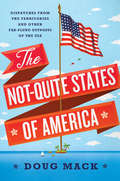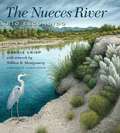- Table View
- List View
The New York Times: From Ferrante's Naples to Hammett's San Francisco, Literary Pilgrimages Around the World
by New York TimesA curated collection of the New York Times' travel column, "Footsteps," exploring iconic authors' relationships to landmarks and cities around the world Before Nick Carraway was drawn into Daisy and Gatsby’s sparkling, champagne-fueled world in The Great Gatsby, F. Scott Fitzgerald vacationed in the French Riviera, where a small green lighthouse winked at ships on the horizon. Before the nameless lovers began their illicit affair in The Lover, Marguerite Duras embarked upon her own scandalous relationship amidst the urban streets of Saigon. And before readers were terrified by a tentacled dragon-man called Cthulhu, H.P. Lovecraft was enthralled by the Industrial Trust tower-- the 26-story skyscraper that makes up the skyline of Providence, Rhode Island. Based on the popular New York Times travel column, Footsteps is an anthology of literary pilgrimages, exploring the geographic muses behind some of history's greatest writers. From the "dangerous, dirty and seductive" streets of Naples, the setting for Elena Ferrante's famous Neapolitan novels, to the "stone arches, creaky oaken doors, and riverside paths" of Oxford, the backdrop for Alice's adventures in Wonderland, Footsteps takes a fresh approach to literary tourism, appealing to readers and travel enthusiasts alike.From the Trade Paperback edition.
The New York Wildlife Encyclopedia: An Illustrated Guide to Birds, Fish, Mammals, Reptiles, and Amphibians
by Scott ShupeIn The New York Wildlife Encyclopedia, nationally known naturalist Scott Shupe has collected information on all the wildlife that reside in the Empire State. The first in a series of state wildlife encyclopedias, this book will be a handy, usable, layman’s guide to New York’s wildlife.Included are over 800 color photographs, depicting the different species of mammals, reptiles, amphibians, birds, and fish, while also offering over 600 range maps to show their territory. Along with basic information for the biology of each animal, Shupe includes the size, habitat, and abundance of each species located in the state.Whether you’re a lover of the outdoors, photography, or are looking to learn more about your state, this comprehensive guide will teach you about the wonderful wildlife that covers the water, earth, and skies of New York.
The New Yorker's Guide to LA, The Angeleno's Guide to NYC
by Henry OwensThis comparative travel guide answers the oft-posed question, "Which city is better: LA or New York?"The short answer: Who cares?! It turns out the cities' similarities are what make it impossible to choose. The New Yorker's Guide to LA, The Angeleno's Guide to NYC -- colorful and comprehensive -- is as much a love letter to these two cities as it is a practical travel guide. By highlighting the parallels between the two places, it will help you get up to speed in New York City or settle into the groove of Los Angeles.Featuring a mirrored design, this book shows which neighborhoods correspond in each city, which pizza places and taco stands can't be missed, and how to seamlessly switch from navigating the MTA to driving on the 405. Covering art, culture, shopping, food, and more, it highlights the similarities while breaking down the nuanced differences in each city. It's practical, must-have guide for tourist and native alike.
The Next Frontier of Restaurant Management: Harnessing Data to Improve Guest Service and Enhance the Employee Experience (Cornell Hospitality Management: Best Practices)
The Next Frontier of Restaurant Management brings together the latest research in hospitality studies to offer students, hospitality executives, and restaurant managers the best practices for restaurant success. Alex M. Susskind and Mark Maynard draw on their experiences as a hospitality educator and a restaurant industry leader, respectively, to guide readers through innovative articles that address specific aspects of restaurant management:* Creating and preserving a healthy company culture* Developing and upholding standards of service* Successfully navigating guest complaints to promote loyalty* Creating a desirable (and profitable) ambiance* Harnessing technology to improve guest and employee experiences* Mentoring employeesMaynard and Susskind detail the implementation of effective customer management and staff training, design elements such as seating and lighting, the innovative use of data to improve the guest experience, and both consumer-oriented and operation-based technologies. They conclude with a discussion of the human factor that is the foundation of the hospitality industry and the importance of a healthy workplace culture. As Susskind and Maynard show, successful restaurants don't happen by accident.
The Next Wave: The Quest to Harness the Power of the Oceans (Scientists in the Field Series)
by Elizabeth RuschJourney to the wave-battered coast of the Pacific Northwest to meet some of the engineers and scientists working to harness the punishing force of our oceans, one of the nature’s powerful and renewable energy sources. With an array of amazing devices that cling to the bottom of the sea floor and surf on the crests of waves, these explorers are using a combination of science, imagination, and innovation to try to capture wave energy in the hopes of someday powering our lives in a cleaner, more sustainable way.
The Night Before Christmas in New York (Night Before Christmas Series)
by Betty Lou Phillips Roblyn HerndonSanta visits the big city—and winds up playing himself in the Macy&’s parade—in this merry take on the classic Christmas poem… Santa&’s pre-Christmas jitters start just before Thanksgiving, and Mrs. Claus knows just what he needs to boost his holiday spirit—a trip to fabulous NYC for a little R&R (and a little shopping for her). They&’re checking out chic stores when what should happen but the Macy&’s parade official spots this Santa on the street and convinces him to fill in and &“play&” Santa in the parade. Santa can&’t help but laugh at the thought of how surprised everyone would be if they knew. The cheering of the children will boost Santa&’s confidence for another year—and later that night, Mr. C borrows the parade sleigh to take a flight over all the boroughs of the city…
The Night Before Christmas in the South (Night Before Christmas Series)
by Barbara G. HagertySanta and the Mrs. take a break from the North Pole weather in this delightfully illustrated take on the classic Christmas tale! It&’s just a week before Christmas and the Clauses have been working nonstop since September. Santa decides to treat his Mrs. to a quick trip below the Mason-Dixon Line, where the livin&’ is easy and the weather is fine!Join them on their merry adventures to Virginia, North Carolina, South Carolina, Georgia, Tennessee, Alabama, Mississippi and Louisiana, where they experience Southern grandeur at its best. In the land of gray moss and sweet tea, they discover all the beautiful landscapes, celebrated cities, historical landmarks, tasty fare, and fine music the South has to offer.
The Night Tiger: The Reese Witherspoon Book Club Pick
by Yangsze ChooTHE NEW YORK TIMES BESTSELLER'The two main characters will captivate you as their paths are destined to cross... you won't be able to put this one down!'Reese Witherspoon'I was willingly propelled into a fascinating and exotic world'Daily MailThey say a tiger that devours too many humans can take the form of a man and walk among us... In 1930s colonial Malaya, a dissolute British doctor receives a surprise gift of an eleven-year-old Chinese houseboy. Sent as a bequest from an old friend, young Ren has a mission: to find his dead master's severed finger and reunite it with his body. Ren has forty-nine days, or else his master's soul will roam the earth forever. Ji Lin, an apprentice dressmaker, moonlights as a dancehall girl to pay her mother's debts. One night, Ji Lin's dance partner leaves her with a gruesome souvenir that leads her on a crooked, dark trail. As time runs out for Ren's mission, a series of unexplained deaths occur amid rumours of tigers who turn into men. In their journey to keep a promise and discover the truth, Ren and Ji Lin's paths will cross in ways they will never forget.Captivating and lushly written, The Night Tiger explores the rich world of servants and masters, ancient superstition and modern ambition, sibling rivalry and unexpected love. Woven through with Chinese folklore and a tantalizing mystery, this novel is a page-turner of the highest order.'An exuberant medley of magic, romance and weirdness'The Times'[A] highly imaginative and a spellbinding read'Woman's Weekly
The Night Tiger: The Reese Witherspoon Book Club Pick
by Yangsze ChooTHE NEW YORK TIMES BESTSELLER'The two main characters will captivate you as their paths are destined to cross... you won't be able to put this one down!'Reese Witherspoon'I was willingly propelled into a fascinating and exotic world'Daily MailThey say a tiger that devours too many humans can take the form of a man and walk among us... In 1930s colonial Malaya, a dissolute British doctor receives a surprise gift of an eleven-year-old Chinese houseboy. Sent as a bequest from an old friend, young Ren has a mission: to find his dead master's severed finger and reunite it with his body. Ren has forty-nine days, or else his master's soul will roam the earth forever. Ji Lin, an apprentice dressmaker, moonlights as a dancehall girl to pay her mother's debts. One night, Ji Lin's dance partner leaves her with a gruesome souvenir that leads her on a crooked, dark trail. As time runs out for Ren's mission, a series of unexplained deaths occur amid rumours of tigers who turn into men. In their journey to keep a promise and discover the truth, Ren and Ji Lin's paths will cross in ways they will never forget.Captivating and lushly written, The Night Tiger explores the rich world of servants and masters, ancient superstition and modern ambition, sibling rivalry and unexpected love. Woven through with Chinese folklore and a tantalizing mystery, this novel is a page-turner of the highest order.'An exuberant medley of magic, romance and weirdness'The Times'[A] highly imaginative and a spellbinding read'Woman's Weekly
The Nile: A Journey Downriver Through Egypt's Past and Present (Vintage Departures)
by Toby WilkinsonA hypnotic journey in the company of one of the world's most acclaimed Egyptologists over the fabled river telling how the Nile continually brought life to an ancient civilization now dead and how it sustained its successors, now in tumult.Renowned Egyptologist Toby Wilkinson leads us through space as much as time: from the river's mystical sources (the Blue Nile which rises in Ethiopia, and the White Nile coursing from majestic Lake Victoria); to Thebes, with its Valley of the Kings, Valley of the Queens, and Luxor Temple; the fertile Delta; Giza, home of the Great Pyramid, the sole surviving Wonder of the Ancient World; and finally, to the pulsating capital city of Cairo, where the Arab Spring erupted on the bridges over the Nile. Along the way, he introduces us to mysterious and fabled characters-the gods, godlike pharaohs, emperors and empresses, who joined their fate to the Nile and gained immortality; the adventurers, archaeologists, and historians who have all fallen under its spell. With matchless erudition and storytelling skill, through a lens equal to both panoramas and close-ups, Wilkinson brings millennia of history into view.
The Nine Lives of Pakistan: Dispatches From A Precarious State
by Declan WalshA New York Times New Book to Watch For (November 2020) The former New York Times Pakistan bureau chief paints an arresting, up-close portrait of a fractured country. Declan Walsh is one of the New York Times’s most distinguished international correspondents. His electrifying portrait of Pakistan over a tumultuous decade captures the sweep of this strange, wondrous, and benighted country through the dramatic lives of nine fascinating individuals. On assignment as the country careened between crises, Walsh traveled from the raucous port of Karachi to the salons of Lahore, and from Baluchistan to the mountains of Waziristan. He met a diverse cast of extraordinary Pakistanis—a chieftain readying for war at his desert fort, a retired spy skulking through the borderlands, and a crusading lawyer risking death for her beliefs, among others. Through these “nine lives” he describes a country on the brink—a place of creeping extremism and political chaos, but also personal bravery and dogged idealism that defy easy stereotypes. Unbeknownst to Walsh, however, an intelligence agent was tracking him. Written in the aftermath of Walsh’s abrupt deportation, The Nine Lives of Pakistan concludes with an astonishing encounter with that agent, and his revelations about Pakistan’s powerful security state. Intimate and complex, attuned to the centrifugal forces of history, identity, and faith, The Nine Lives of Pakistan offers an unflinching account of life in a precarious, vital country.
The Ninja Librarians: Sword in the Stacks
by Jen Swann DowneyShelve This Book Under "D" for Dangerous.(Also daring, dramatic, dashing, daft, and dazzling!)After stumbling upon the secret society of time-traveling ninja librarians, Dorrie has finally joined Petrarch's Library as an apprentice! One day, she'll actually go on missions to rescue people whose words have gotten them into trouble. For now she's taking some interesting classes: First and Last Aid: When Nobody Else is Coming Spears, Axes, and Cats: Throwing Objects with Precision and Flair Codes, Invisible Inks, and Smoke Signals: Keeping Secrets 101But on a training mission to 1912 England, Dorrie finds herself dangerously close to a member of the Stronghold - the Library's biggest enemy. This is her opportunity! Dorrie can spy on the enemy, find the missing key...and become a real Lybrarian!But if she makes a mistake, Dorrie could lead their enemy right to the very place she's trying to save...and everyone she cares about.Praise for The Ninja Librarians: The Accidental Keyhand:"Scrambles so madcap that it's hard to turn the pages fast enough to keep up."-Kirkus Starred Review "[A] melding of fantasy, adventure, and history...Readers who miss the collegial, magical setting of Hogwarts will enjoy exploring Petrarch's Library." - School Library Journal"Delightfully funny from the first page." -Booklist"A rollicking adventure with a smart heroine, heaps of mystery and the whole of history to explore. It's like finding Lara Croft running your local library! " -Lissa Evans, author of Horten's Miraculous Mechanisms
The Nivelle Offensive and the Battle of the Aisne 1917: A Battlefield Guide to the Chemin des Dames
by Andrew UffindellThe notorious plateau of the Chemin des Dames saw some of the heaviest fighting of the First World War. Situated just 100 km north-east of Paris, it was the scene in 1917 of the bitterly-controversial Nivelle offensive, which is remembered today as one of the worst disasters in military history.For battlefield tourists, the Chemin des Dames is among the most fascinating sites on the entire Western Front, yet until now there has never been a detailed English guide to the actions that raged there in 1917. This new book by Andrew Uffindell fills that gap: as well as demolishing the many myths about the Nivelle offensive, it enables readers to explore the remarkable battlefield for themselves. Five tours supplemented by forty-six stops at individual places of interest provide an exceptional insight into the struggle for the Chemin des Dames. Illustrated with a wealth of maps and photographs, this book will be essential reading for anyone interested in the First World War.
The No-Nonsense Guide to Tourism
by Pamela NowickaThis guide demystifies the often invisible impacts of global tourism, one of the biggest industries in the world, from labor conditions to development by stealth, to the role of elites and the cultural impacts on both the visitor and the visited.It also takes in themes such as the gap year and the role of travel and vacations in Western cultures, and examines the "happy smiling faces" syndrome and asks whether this is just a reworking of old colonial relationships. Pamela Nowicka is a journalist and consultant writing on numerous tourism and ethics subjects.
The Nogal Mesa: A History of Kivas and Ranchers in Lincoln County (Landmarks)
by Gary CozzensThis book was a finalist for the New Mexico Book Co-Op History Book of the Year. Most people think of Billy the Kid and the Lincoln County War when Lincoln County, New Mexico is mentioned. "Yet, the county has a rich history besides that chapter of lawlessness and violence. In writing this book I wanted to tell the story of the miners and forest rangers and the Civilian Conservation Corps and early settlers."The Jornada Mogollon culture was here over a thousand years ago but had left before Christopher Columbus arrived in the new world. "They have left pieces of their lifestyle in the form of pueblos and pottery. "A railroad was built in the basin below the Mesa, but the water there was full of alkaline and chemicals. "The Mesa had pristine mountain water and an engineering miracle was built in the form of a pipeline to get the water from the Mesa to the railroad. "A western religious revival in the form of the Ranchman's Camp continues this summer for the 71st year.
The Normans in South Wales, 1070-1171
by Lynn H. NelsonA frontier has been called "an area inviting entrance. " For the Norman invaders of England the Welsh peninsula was such an area. Fertile forested lowlands invited agricultural occupation; a fierce but primitive and disunited native population was scarcely a formidable deterrent. In The Normans in South Wales, Lynn H. Nelson provides a comprehensive history of the century during which the Normans accomplished this occupation. Skillfully he combines facts and statistics gleaned from a variety of original sources--The Anglo-Saxon Chronicle, the Domesday Book, Church records, charters of the kings and of the marcher lords, and more imaginative literary sources such as the chanson de geste and the frontier epic--to give a vivid picture of a century of strife. He describes the fluctuating conflict between Norman invaders in the lowlands and Welsh tribesmen in the highlands; the hard struggle of medieval frontiersmen to take from the new land a profit commensurate with their labors; the development of a Cambro-Norman society distinct and quite different from the Anglo-Norman culture which engendered it; and the attempt of the frontiersman to prevent the Anglo-Norman authorities from taking control of the lands he had won. The turbulent Welsh tribes provided an ever present harassment along the frontier, and Nelson begins his presentation with an account of the failure of the Saxons to control them. He examines the methods adopted by William the Conqueror to cope with the problem--the creation of the great marcher lordships and the subsequent problems in controlling these lordships--and the weakness of some Anglo-Norman kings and the strength of others. By 1171 the conquest of the Welsh frontier was complete; but as Nelson points out, this conquest was strangely limited. The frontier, which extended throughout the lowlands of Wales, stopped at the 600-foot contour line in the mountains. In his final chapter Nelson speculates upon the curious fact that large areas of seemingly inviting moorlands lying above this line remained closed to the Cambro-Norman, and his speculations lead him to some interesting inferences about the nature of the frontier's influence upon the civilization which moves in to occupy it.
The North Cape: A Journey by Motorbike (Travelogue)
by John BrookeThis is the account of a summer journey of over four thousand kilometres by motorbike from Nice, on the Mediterranean coast of France, to the North Cape of Norway, Europe's most northern extremity, a headland surrounded by the Arctic Ocean. Equipped with a small tent, the author camped until he had crossed the Arctic Circle, using thereafter the wooden cabins that are to be found in the north of Scandinavia. The author has tried to convey the pleasures of this form of exploration and has given his thoughts to those who may wish to follow, whether on a motorbike or other form of transport, or from the comfort of their own home.
The North Country Trail: The Best Walks, Hikes, and Backpacking Trips on America’s Longest National Scenic Trail
by North Country Trail Association Ron StricklandThe North Country Trail is the longest of America's eleven congressionally designated National Scenic Trails. Winding through seven states--New York, Pennsylvania, Ohio, Michigan, Wisconsin, Minnesota, and North Dakota--the NCT's 4,600 miles attract more than one million visitors annually. These hikers are treated to a smorgasbord of Upper Midwest hiking featuring everything from urban strolls to backcountry adventure through mountains, rivers, prairies, and shoreline. This book is the definitive guide for NCT hikers--whether first-timers, seasoned backpackers, or any level in between--who wish to maximize their experience on this splendid trail. In addition to a full overview of the trail's tread in each state, the guide describes in detail forty of the NCT's premier segments, with helpful information including easy-to-read trail descriptions, physical and navigation difficulties, trail highlights, hiking tips, and precise maps incorporating the latest GPS technology.
The Northern Sea Route as a Shipping Lane
by Tadeusz PastusiakThis book analyses the current and future viability of the Northern Sea Route as a stable transport route for the international transit traffic between Europe and the Far East. It includes the present conditions, defining and evaluating viability factors for using the Northern Sea Route (NSR). The book makes a projection for NSR in the future, taking into account the climatic change in the Arctic findings presented in the IPCC report. This study, based on the author's PhD thesis, analyses meteorological, hydrologic, bathymetric and other data for the evaluation of the navigation criteria. It is intended for a wide spectrum of readers, from students and scientists of Earth sciences and polar geography, navigation, political science researchers and politicians interested in Arctic affairs.
The Northwest Coastal Explorer: Your Guide to the Places, Plants, and Animals of the Pacific Coast
by Robert Steelquist“Part field guide, part travel guide, Steelquist writes with the authoritative voice of that friend you want next to you on the trail or in the dunes—the one who knows just where to go for a weekend getaway and what to pack for the Pacific Northwest’s unpredictable weather.” —Portland Monthly Millions of visitors explore the magnificent coastline of the Pacific Northwest and all that it provides—unique plant life, easy-to-find animals, and magical places. The Northwest Coastal Explorer is a fun, engaging, lushly-illustrated guide to the marine life of Oregon, Washington, and British Columbia. Profiles of the flora and fauna include tips on where and how to find them—like the ochre sea stars commonly discovered on exposed rocks and the olive snails found on sandy beaches—while the included getaway guide highlights the best weekend trips for each area.
The Northwest Nature Guide: Where to Go and What to See Month by Month in Oregon, Washington, and British Columbia
by James Luther DavisFrom winter whale watching to autumn seabirding, The Northwest Nature Guide offers more than 170 best bets for wildlife adventures throughout Oregon, Washington, and British Columbia—as well as your own backyard. With contagious enthusiasm and irrepressible humor, James Luther Davis shares his insider tips, helpful maps, and experience to guarantee readers know where they need to go to see nature at its peak every month of the year. Whatever the season and no matter the weather, Davis entices nature lovers of all ages to discover what they might otherwise miss. The intrepid may find the three-toed woodpecker or even Sasquatch. The inquisitive will learn why auks fly but penguins don't. Everyone will discover outdoor adventures that revitalize, inspire, and renew their appreciation for nature. Whether it's tidepooling by the shore, newt pursuit in the woods, or trailing bighorn sheep in the mountains, this practical guide helps make the most of every fresh-air opportunity.
The Norton Book of Travel
by Paul FussellEditor Paul Fussell has brought together some of the best travel writing of all time from the world's most recognized travelers -- Marco Polo, Darwin and Kerouac to name a few -- and has explored the traveler's psyche from the Age of Discovery to the Age of Mass Tourism.
The Not-Quite States of America: Dispatches from the Territories and Other Far-Flung Outposts of the USA
by Doug MackAn eye-opening journey to the most overlooked parts of America. Everyone knows that America is 50 states and…some other stuff. Scattered shards in the Pacific and the Caribbean, the not-quite states—American Samoa, Guam, Puerto Rico, the Northern Mariana Islands, and the U.S. Virgin Islands—and their 4 million people are often forgotten, even by most Americans. But they’re filled with American flags, U.S. post offices, and Little League baseball games. How did these territories come to be part of the United States? What are they like? And why aren’t they states? When Doug Mack realized just how little he knew about the territories, he set off on a globe-hopping quest covering more than 30,000 miles to see them all. In the U.S. Virgin Islands, Mack examines the Founding Fathers’ arguments over expansion. He explores Polynesia’s outsize influence on American culture, from tiki bars to tattoos, in American Samoa. He tours Guam with members of a military veterans’ motorcycle club, who offer personal stories about the territory’s role in World War II and its present-day importance for the American military. In the Northern Mariana Islands, he learns about star-guided seafaring from one of the ancient tradition’s last practitioners. And everywhere he goes in Puerto Rico, he listens in on the lively debate over political status—independence, statehood, or the status quo. The Not-Quite States of America is an entertaining account of the territories’ place in the USA, and it raises fascinating questions about the nature of empire. As Mack shows, the territories aren’t mere footnotes to American history; they are a crucial part of the story.
The Nueces River: Río Escondido (River Books)
by Margie CrispFirst appearing on early Spanish maps as the Río Escondido, or hidden river, and later named Río de las Nueces after the abundant pecan trees along its banks, the Nueces today is a stream of seeming contradictions: a river that runs above and below ground; a geographic reminder of a history both noble and egregious; and a spring-fed stream transformed into a salty, steep-sided channel. <P><P>From its fresh, clear headwaters on the Edwards Plateau, Margie Crisp and William B. Montgomery follow the river through the mesquite and prickly pear of the South Texas Plains, to the river’s end in Nueces and Corpus Christi Bays on the Gulf of Mexico. With vivid prose and paintings, they record their travels as they explore the length of the river on foot, kayak, and fishing boat, ultimately weaving a vivid portrait of today’s Nueces. Capturing the river’s subtle beauty, abundant wildlife, diverse culture, and unique history of exploration, conflict, and settlement, they reveal the untold story of this enigmatic river with passion, humor, and reverence.
The Number: Why Companies Lied And The Stock Market Crashed
by Alex BerensonWith a new Afterword by the author and a new Foreword by Mark Cuban In this commanding big-picture analysis of what went wrong in corporate America, Alex Berenson, a top financial investigative reporter for The New York Times, examines the common thread connecting Enron, Worldcom, Halliburton, Computer Associates, Tyco, and other recent corporate scandals: the cult of the number. Every three months, 14,000 publicly traded companies report sales and profits to their shareholders. Nothing is more important in these quarterly announcements than earnings per share, the lodestar that investors--and these days, that's most of us--use to judge the health of corporate America. earnings per share is the number for which all other numbers are sacrificed. It is the distilled truth of a company's health. Too bad it's often a lie. Alex Berenson's The Number provides a comprehensive, brutally factual overview of how Wall Street and corporate America lost their way during the great bull market that began in 1982. With wit and a broad historical perspective, Berenson puts recent corporate accounting (or accountability) disasters in their proper context. He explains how the wheels came off the wagon, giving readers the information and analysis they need to understand Enron, Tyco, WorldCom, Halliburton, and the rest of the corporate calamities of our times.
